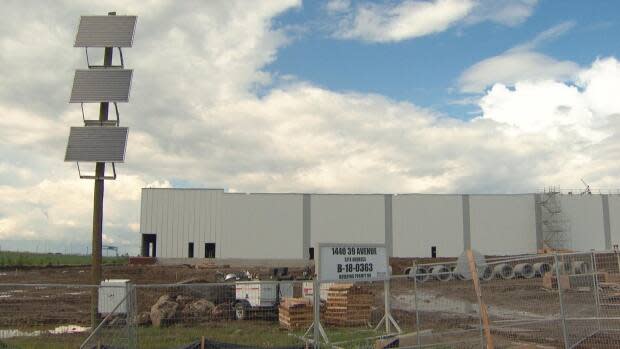E-commerce drives demand for warehouse real estate in Edmonton
The rise in online shopping during the pandemic, coupled with consumers who want to get purchases in their hands quickly, is giving a bump to warehousing real estate in Edmonton.
Commercial Realtors are seeing an increased demand for the buildings required to store and distribute online purchases, and that demand is only predicted to increase, Zeshan Qureshi, associate partner at Cushman and Wakefield, told CBC Radio's Edmonton AM.
"Consumer trends have been shifting for the last number of years to more online, and we're seeing that COVID may have sped up some of those processes," Qureshi said.
A Statistics Canada report found that overall retail sales declined by 17.9 per cent between February and May, while online shopping doubled during that same time period.
The pandemic created a new demand for products people would not normally have purchased online, said Qureshi.
Examples include tools to tackle home renovation projects, gym equipment when fitness facilities closed, and boxed meal delivery when restaurant dining is off the table.
There's also been a boost in more direct pandemic supplies, which require warehousing, he said.
"There was a huge rush for producers to make cleaning supplies and PPE, COVID testing, future vaccines, all those things need to get housed somewhere and, eventually, make their way to consumers," said Qureshi.
Part of the increased demand for warehouse space in Edmonton is fuelled by the promise of quick delivery. You need a warehouse nearby to do that, Qureshi said.
"The consumer expectation is not only is it going to get delivered to me, but we know how it is, a week or two weeks seems like a long time. I'd prefer to have it in two days," Qureshi said.
Filling the energy gap

The demand for warehousing in Edmonton and area comes as demand from other commercial tenants, such as restaurants, offices and retail, drops off.
Office vacancy remains high in Edmonton, hovering around 19 per cent, according to a recent report from commercial real estate company CBRE Canada.
Kris Augustson, vice-president of leasing and land sales for Remington Development Corporation, said the increased demand for warehouse space related to e-commerce could help to fill some of the light industrial real estate vacancies left by shuttered energy companies.
"Our traditional energy sector users are starting to scale back. We're seeing a decline in demand in that market," Augustson said. "However, we've been able to fill that with users who might not have been in the market over the last three years, by going to the e-commerce side of things."
Remington Development Corporation's biggest project is Discovery Business Park, on Highway 2 just north of the Edmonton International Airport. It offers a mix of light industrial, commercial and business park space.
Amazon is one of the biggest tenants in Discovery Business Park, with a 115,000 square-foot building on 21 acres, said Augustson. While the Amazon deal was finalized before the pandemic, in February 2020, Amazon started operations there in August.
Amazon also opened its fulfilment centre in Nisku in August, a massive one-million-square-foot facility, where staff pick and ship orders.
Lots of companies are circling the market, looking at available real estate, but lacking confidence to do deals, Augustson said.
However, he thinks industrial real estate, buoyed in part by the growing e-commerce sector, might be in a better position than other sectors in the years to come.
"It will be an interesting couple years," he said. "No one has a crystal ball, for sure, but I do think industrial, long term, will weather the storm fairly well."

